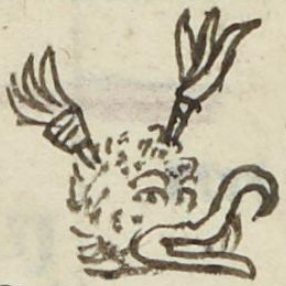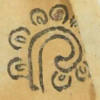Poyon (MH679r)
This black-line drawing of the simplex glyph for the personal name Poyon (either “Rose-Like Flower” or “Hallucinogen”) is attested here as a man’s name. The glyph shows a profile view (facing right) of a beaked creature with two feathered headdresses. The beak is open, exposing teeth. The headdresses each seem to be on sticks and have three feathers, bound at the bottom.
Stephanie Wood
This could be viewed as a frightening creature, perhaps one that would be seen in hallucinations. Other hallucinogens include ololiuhqui, peyotl, and mushrooms, such as nanacatl. But the names Poyon and Poyoma are much more common. Note, below, how Poyon glyphs can be flowers. Perhaps the flower contains the hallucinogenic material that goes into poyomahtli, the drug mixture. The flower is a sign that would draw less attention from the clergy than this one, which shows a frightening creature.
Stephanie Wood
1560
Jeff Haskett-Wood
alucinógenos, alucinaciones, plumas, feathers, nombres de hombres

poyon, a narcotic, a hallucinogen, https://nahuatl.wired-humanities.org/content/poyon
poyoma(tl), flower like a rose, https://nahuatl.wired-humanities.org/content/poyomatl
poyomah(tli), hallucinogenic drug mixture to drink or smoke, https://nahuatl.wired-humanities.org/content/poyomahtli
ololiuhqui, a flowering, narcotic plant, https://nahuatl.wired-humanities.org/content/ololiuhqui
peyo(tl), the mescal cactus, whose buttons, when consumed, produce a narcotic effect, https://nahuatl.wired-humanities.org/content/peyotl
Alucinógeno, o Alucinación
Stephanie Wood
Matrícula de Huexotzinco, folio 679r, World Digital Library, https://www.loc.gov/resource/gdcwdl.wdl_15282/?sp=438&st=image.
This manuscript is hosted by the Library of Congress and the World Digital Library; used here with the Creative Commons, “Attribution-NonCommercial-ShareAlike 3.0 License” (CC-BY-NC-SAq 3.0).








